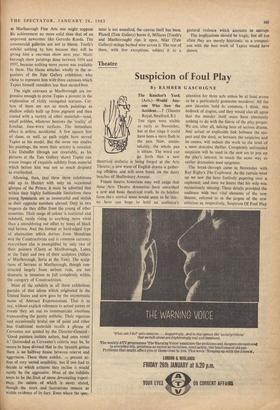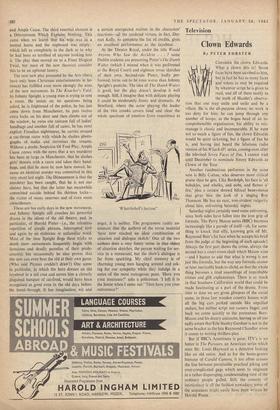Theatre
Suspicion of Foul Play
By BAMBER GASCOIGNE The Knacker's Yard.
(Arts.)—Would Any- one Who Saw the Accident...? (Theatre Future theatre historians may well judge that these Arts Theatre dramatists have unearthed a new and basic theatrical truth. In its briefest form their central tenet would seem to be this: no hero can hope to hold an audience's attention for three acts unless he at least seems to be a particularly gruesome murderer. All the new theorists hold in common, I think, this bedrock of dogma, and they would also all agree that the murder itself must have absolutely nothing to do with the fabric of the play proper. We are, after all, talking here of serious drama. Any actual or explicable link between the sus- pect and the deed, or between the suspicion and its causes, will reduce the work to the level of a mere detective thriller. Completely unfounded suspicion will be used in the new art to pep up the play's interest, in much the same way as earlier dramatists used epigrams.
The break-through came in November with Ray Rigby's The Cupboard. As the curtain went up we saw the hero furtively papering over a cupboard; and soon we learnt that his wife was mysteriously missing. These details provided the audience with two vital elements of the new theatre, referred to in the jargon of the new criticism as, respectively, Suspicion Of Foul Play and Ample Cause. The third essential element is a Denouement Which Explains Nothing. This came when we learnt that his wife was in a mental home and the cupboard was empty : which left us completely in the dark as to why he had been so terrified of anyone looking into it. The play then moved on to a Final Illogical Twist, but most of the new theorists consider this to be an optional luxury.
The next new play presented by the Arts (there have only been Christmas entertainments in be- tween) has fulfilled even more strongly the aims of the new movement. In The Knacker's Yard, by Johnny Speight, a young man is trying to rent a room. He insists on no questions being asked, he is frightened of the police, he has just come down from Manchester, he puts twelve extra locks on his door and then climbs out of the window, he owns one suitcase full of ladies' handbags and another full of canes, he has most explicit Freudian nightmares, he carries around a cut-throat razor with which he slashes photo- graphs of nudes and terrorises the tenants. Without a doubt, Suspicion Of Foul Play. Ample Cause comes with the news that a sex murderer has been at large in Manchester, that he slashes girls' throats with a razor and takes their hand- bags, and that he must by now have moved, be- cause an identical murder was committed in this very street last night. The Denouement is that the murderer has been caught, that he is not our sinister hero, but that the latter has meanwhile committed suicide behind his thirteen locks— the victim of many neuroses and of even more coincidences.
These are hut early days in the new movement, and Johnny Speight still couches his powerful drama in the idiom of the old theatre, and, in particular, of Harold Pinter—i.e., the relentless repetition of simple phrases, interrupted now and again by an elaborate or unfamiliar word. Most of the time Speight flogs these tricks to death (new movements frequently begin with ferocious and deadly parodies of their prede- cessors), but occasionally he also proves that the new can even beat the old at their own game. (Who said Picasso couldn't draw?) One scene in particular, in which the hero dresses an old layabout in a tail coat and serves him a cleverly disguised banquet of cat-food, would have been recognised as good even in the old days before the break-through. It has imagination, wit and a certain unexpected realism in the characters' reactions—all the outdated virtues, in fact. Der- mot Kelly, to complete the list of credits, gives an excellent performance as the layabout.
At the Theatre Royal, under the title Would Anyone Who Saw the Accident . . . ? some Dublin students are presenting Pinter's The Dumb Waiter (which I missed when it was performed at the Royal Court) and eighteen revue sketches of their own. Second-rate Pinter, badly per- formed, turns out to be even worse than Johnny Speight's pastiche. The idea of The Dumb Waiter is good, but the play doesn't develop it well enough. Still, I imagine that with delicate playing it could be moderately ,funny and dramatic. At Stratford, where the actor playing the leader of the tiVo crooks covers loud and clear the whole spectrum of emotion from impatience to • 'Whanhehell's fustian?'
anger, it is neither. The programme rashly an- t:Jounces that the authors of the revue material `have now reached an ideal combination of situation and dialogue sketch.' One of the two authors does a very funny mime in that oldest of situation sketches, the person waiting for ser- vice in a restaurant, but the show's dialogue is far from sparkling. My chief memory is of charming young men hanging around and ask- ing for our sympathy while they indulge in a series of the most outrageous puns. 'Have you your insurance?' asks a policeman. 'I left it in the house when I came out.' Then have you your outsurance?'







































 Previous page
Previous page